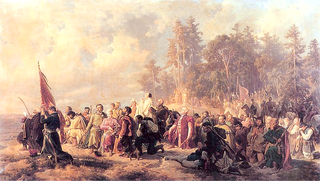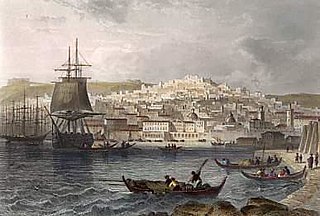 W
WThe First Anglo–Mysore War (1766–1769) was a conflict in India between the Sultanate of Mysore and the East India Company. The war was instigated in part by the machinations of Asaf Jah II, the Nizam of Hyderabad, who sought to divert the company's resources from attempts to gain control of the Northern Circars.
 W
WThe Bar Confederation was an association of Polish nobles (szlachta) formed at the fortress of Bar in Podolia (Ukraine) in 1768 to defend the internal and external independence of the Polish–Lithuanian Commonwealth against Russian influence and against King Stanisław II Augustus with Polish reformers, who were attempting to limit the power of the Commonwealth's wealthy magnates. The founders of the Bar Confederation included the magnates Adam Stanisław Krasiński, Bishop of Kamieniec, Karol Stanisław Radziwiłł, Casimir Pulaski, his father and brothers and Michał Krasiński. Its creation led to a civil war and contributed to the First Partition of the Polish–Lithuanian Commonwealth. Moritz Benyowszki was the most known European volunteer of Bar confederation, supported by Roman Catholic France and Austria. Some historians consider the Bar Confederation the first Polish uprising.
 W
WThe Battle of Bhaktapur was the final campaign in the Gorkha conquest of Nepal. It took place in Bhaktapur in 1769, and resulted in the victory of the Gorkhali king Prithvi Narayan Shah, giving him control of the entire Kathmandu Valley and adjoining areas.
 W
WThe First Carib War was a military conflict between the Carib inhabitants of Saint Vincent and British military forces supporting British efforts at colonial expansion on the island.
 W
WThe Danish–Algerian War was a conflict lasting from 1769 to 1772 between Denmark-Norway and Deylik of Algiers which was De jure province of the Ottoman Empire, but it was de facto mostly independent. It is also known as the Algerian Expedition, or "The War Against Algeria".
 W
WThe French conquest of Corsica was a successful expedition by French forces of the Kingdom of France under Comte de Vaux, against Corsican forces under Pasquale Paoli of the Corsican Republic. The expedition was launched in May 1768, in the aftermath of the Seven Years' War. A French expeditionary force was landed on the island of Corsica, then ruled by the Corsican Republic. Marching inland to overcome any Corsican opposition, the French force initially suffered an unexpected defeat at the Battle of Borgo. But a new commander, the Comte de Vaux, was appointed to lead the expedition, and decisively defeated the Corsican army at the Battle of Ponte Novu in 1769, effectively bringing an end to Corsican resistance.
 W
WThe Battle of Ponte Novu took place on May 8 and 9 1769 between royal French forces under the Comte de Vaux, a seasoned professional soldier with an expert on mountain warfare on his staff, and the native Corsicans under Carlo Salicetti. It was the battle that effectively ended the fourteen-year-old Corsican Republic and opened the way to annexation by France the following year.
 W
WThe Sino-Burmese War, also known as the Qing invasions of Burma or the Myanmar campaign of the Qing dynasty, was a war fought between the Qing dynasty of China and the Konbaung dynasty of Burma (Myanmar). China under the Qianlong Emperor launched four invasions of Burma between 1765 and 1769, which were considered as one of his Ten Great Campaigns. Nonetheless, the war, which claimed the lives of over 70,000 Chinese soldiers and four commanders, is sometimes described as "the most disastrous frontier war that the Qing dynasty had ever waged", and one that "assured Burmese independence". Burma's successful defense laid the foundation for the present-day boundary between the two countries.